A report by McKinsey & Company says 88% of respondents acknowledge the use of AI in their business functions (at least one for sure).
In the realm of digital marketing, the adoption of Artificial Intelligence is on the rise. Marketing leaders are already harnessing the potential of AI tools to automate their content creation processes, drive personalization across channels, and boost productivity.
| Eyeing the market statistics, the AI in social media is expected to reach $8.1 billion by 2030, growing at a CAGR of 19.3%, up from $2.4 billion as reported in 2024. |
CMOs, founders, marketers, and social managers should integrate AI in social media as a crucial aspect to outshine competitors.
How can you utilize AI for social media marketing?
Well, take it easy!
We are here with the 12 best social media AI use cases to help you make the most of the technology, AI social media tools to personalize marketing for platform users, and risks that you should avoid to attain the expected outcomes.
Why AI in Social Media Matters?
Utilizing AI in social media, brands and users can see more relevant and engaging content, despite only the most recent posts.
Yes, AI is a productivity tool, but not just that. It’s a factor that’s transforming how marketers drive outcomes and how social media audiences interact with social networks.
Market Growth and Business Impact
- In 2025, the AI in the social media market was valued at $2.69 billion, and is anticipated to reach $9.25 billion by 2030, expanding at a CAGR of 28.04%.
- The AI in marketing market size is predicted to grow $217.33 billion by 2034, says Precedence Research. In 2025, it will touch $25.83 billion.
- Around 51% of digital marketers utilize AI tools for content optimization for the likes of search engine optimization (SEO) and email campaigns.
- 43% of managers give credit to AI for their effective social media strategy.
- Around 50% marketers use artificial intelligence to create content to complement their efforts.
Let’s have a walkthrough on social media automation with AI :
- AI-driven personalization leads to higher user engagement as AI helps serve content matching the individual’s interests and behavior patterns.
- Using automated tools, marketers manage post scheduling, chat responses, and creative suggestions, freeing up humans to focus on strategy.
- Advanced analytics leverage machine learning to recognize social media trends, content formats, and posting times that are likely to perform best, eliminating the guesswork and increasing ROI.
Modern social platforms are already reaping the rewards of AI :
- Instagram: AI empowers personalized feeds, detects spam automatically, explores page recommendations, and even allows the usage of AI-generated filters in Reels.
- TikTok: Almost entirely, AI algorithms drive the “For You Page” (FYP) on TikTok that foretell which videos have the maximum possibility of retaining engagement. This is one of the key reasons why the social platform is witnessing ultimate growth.
- LinkedIn: AI optimizes professional opportunity recommendations, content relevance, and feed personalization based on user behavior signals, such as likes, shares, and comments.
Top 12 Use Cases of AI in Social Media
Reviewing the latest facts and figures about AI in social media, undoubtedly, you will choose the technology to scale your performance, boost engagement, and attain measurable results, besides just experimenting with it.
Here are the top 12 valuable use cases where AI emerges with true business outcomes for modern social media marketers.
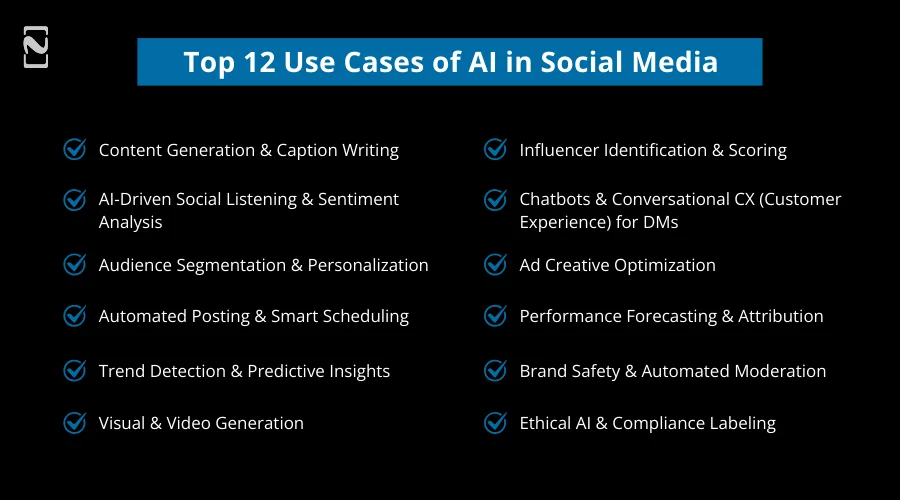
1. Content Generation & Caption Writing
With AI, brands can create top-quality social media content at scale, maintaining the required consistency or tone.
Role of AI:
- AI generates captions, CTAs, and post ideas.
- The technology adapts the tone for various platforms ( like formal for LinkedIn and conversational for Instagram).
- It suggests hashtags according to reach and relevance.
Why AI in content generation matters for SEO & growth:
- It diminishes content fatigue.
- AI improves posting frequency with no extra workload.
- It backs long-tail keyword targeting in captions.
2. AI-Driven Social Listening & Sentiment Analysis
In real-time, AI scrutinizes millions of social conversations to comprehend what audiences are trying to say and how they actually feel.
Key capabilities:
- AI helps in brand sentiment tracking, whether it’s positive, negative, or neutral.
- Competitive benchmarking.
- Early detection of trending discussions or PR risks.
Business value:
- AI social listening provides rapid crisis response.
- It helps with robust brand reputation management.
- It makes better product and campaign decisions.
3. Audience Segmentation & Personalization
By categorizing users based on interests, intent, and behavior, AI delivers hyper-personalized social experiences.
How AI helps:
- AI foretells the preference of content per distinct segment.
- It delivers personalized messages at scale
- The technology enhances relevance across paid and organic campaigns.
Outcomes: AI in audience segmentation and personalization result in better retention, higher engagement rates, and improved conversion metrics.
4. Automated Posting & Smart Scheduling
Using AI, digital marketers don’t have to guess about posting time, as AI suggests optimal posting times based on audience behavior and historical performance.
AI advantages:
- Platform-specific scheduling.
- It’s best for auto-rescheduling based on engagement trends.
- The technology performs frequency optimization to prevent audience fatigue.
SEO impact: AI in automated posting and smart scheduling leads to consistent publishing that improves brand visibility and engagement signals.
5. Trend Detection & Predictive Insights
Before the emerging trends reach their peak, AI detects them, allowing brands to be the early adopters.
Use cases:
- AI is used for predicting content performance.
- It also identifies viral formats and hashtags.
- The technology plan campaigns consider upcoming trends.
Why it’s powerful: AI in trend detection and predictive insights makes you the first-mover, which helps increase shareability and reach.
6. Visual & Video Generation
One of the major engagement and ranking factors on social platforms is visual storytelling, which accelerates when marketers use AI in social media.
Capabilities include:
- AI helps automate resizing for platform formats.
- AI-generated images and short videos.
- Also, the technology provides captions and smart thumbnails for Reels and Shorts.
Digital Marketing benefit: AI in visual and video generation helps with better discoverability, increased completion rates, and mitigated creative production costs.
7. Influencer Identification & Scoring
Influencers harness AI to remove their guesswork, which helps them analyze audience quality, authenticity, and performance history.
AI evaluates:
- Audience demographics
- Engagement authenticity
- Brand fit and predicted ROI
Results: Use of AI in influencer marketing provides smarter partnerships and improved influencer campaign results.
8. Chatbots & Conversational CX (Customer Experience) for DMs
AI-powered chatbots are best for managing direct messages and comments, while maintaining a human-like tone.
Common uses:
- Chatbots answering FAQs.
- It also helps with order tracking and support.
- It performs lead qualification to check if the leads match the business.
Why it converts: AI chatbots help with prompt responses that boost customer experience and elevate lead capture from social platforms.
9. Ad Creative Optimization
AI holds the caliber to constantly test and optimize social media ad creatives for expected performance.
How AI improves ads:
- It auto-tests visuals, headlines, and CTAs.
- AI pauses creatives that are falling short.
- It scales winning variations.
Outcome: AI in ad creative optimization leads to higher ROAS (Return On Ad Spend), lower cost per client (CPC), and rapid optimization cycles.
10. Performance Forecasting & Attribution
AI predicts the performance and allot value across campaigns, assisting the teams in proving ROI.
AI insights include:
- Engagement and conversion forecasts
- Budget allocation recommendations
- Multi-touch attribution modeling
Why this matters: AI knows the importance of data from leadership. Thus, it converts social metrics into business metrics.
11. Brand Safety & Automated Moderation
AI in social media detects non-compliant or harmful content swiftly, thereby protecting brands.
Use cases:
- Spam and hate-speech detection
- Policy enforcement at scale
- Comment moderation
Business Impact: This helps businesses with safer online communities and diminished reputational risk.
12. Ethical AI & Compliance Labeling
AI focuses on evolving social media regulations, and when it encounters such, it helps brands foster transparency and trust.
Key considerations:
- During this, marketers avoid biased outputs
- They label AI-generated content
- Ensure alignment with the platform and legal guidelines
Why it’s critical: With the use of ethical AI, you can reinforce credibility and lasting audience trust.
Top AI Tools & Platforms For Social Media
Obviously, when it comes to “digital” marketing, you can’t save yourself from an overwhelming amount of data that’s generated daily.
Here, AI’s role comes into play, which manages a huge data volume coming from social media platforms.
Leveraging AI tools, you can improve features of social media platforms and stay ahead in handling social media activities across different use cases, like social media monitoring, text and visual content creation, brand awareness campaigns, influencer research, and more.
Let’s check out the best AI tools for social media marketing 2026 :
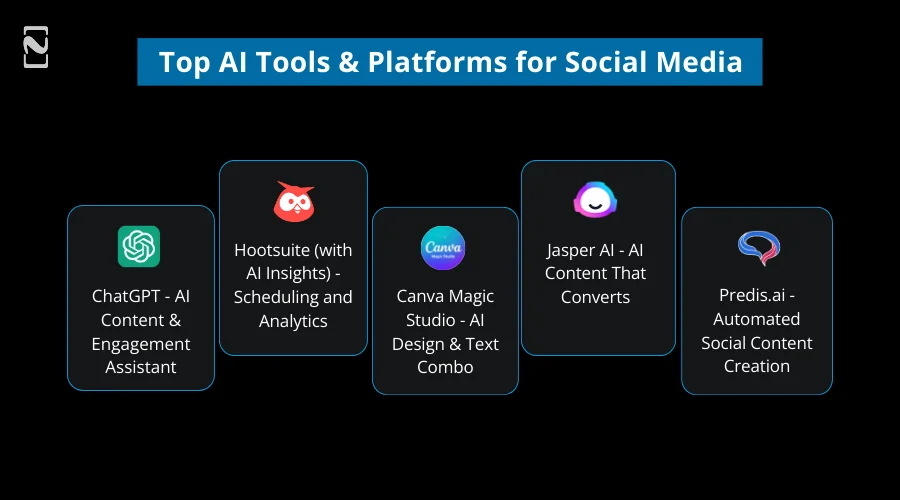
➤ ChatGPT – AI Content & Engagement Assistant
Best for: Content generation, engagement replies, idea brainstorming, and customer interaction.
ChatGPT uses generative AI for social media to quickly create captions, audience responses, post ideas, and campaign copy, which makes it the most versatile tool for marketers in 2026.
ChatGPT comes with the power to adapt style, tone, and messaging across different platforms; thus, this AI tool is perfect for speedy content workflows.
Use cases:
- ChatGPT draft DM replies or FAQs.
- It generates captions tailored to every platform.
- It creates engaging hooks and CTAs for posts.
➤ Hootsuite (With AI Insights) – Scheduling and Analytics
Best for: Planning, analytics, scheduling, and performance insights in one place.
The capability of AI enhancements in Hootsuite streamlines recommendations for the best posting times, assists you in understanding the engagement patterns, and optimizes scheduling.
The teams that have to juggle with several channels, this tool works magically by linking creative results with measurable performance, leading to smarter and easier execution.
Why it matters:
- It helps with centralized publishing and an analytics dashboard.
- The tool offers AI recommendations for optimization and timing.
- It performs across every major social platform.
➤ Canva Magic Studio – AI Design & Text Combo
Best for: Visual content creation and text generation.
Canva is constantly dominating, being a user-friendly design platform. Above that, Magic Studio, a feature of Canva, now incorporates AI-enabled text and image assistance.
Users can craft visuals and even generate hashtags/captions in a unified workspace that notably mitigates the time required to create professional-level social content.
Standout benefits:
- AI-generated templates and visuals
- Caption and branding suggestions
- Auto-resizing for stories, reels, posts
➤ Jasper AI – AI Content That Converts
Best for: Copywriting and high-converting content across platforms.
Among the digital marketers, Jasper stays the #1 choice for social media copy, branded posts, and ads. The AI tool fuses AI creativity with conversion-targeting writing templates to help your content convert, besides just engaging.
If your social activity backs lead gen, sales, or landing page tracking, Jasper AI is an ideal choice for you.
Use cases:
- It helps create ad copy and carousel text.
- Campaign messaging frameworks.
- The tool creates social captions aligning with your brand voice.
➤ Predis.ai – Automated Social Content Creation
Best for: Full post creation (including text, visuals, and hashtags).
Predis.ai holds the caliber to turn simple prompts into full social media posts, embracing captions, visuals, and hashtag suggestions.
This is extremely useful for solopreneurs or small teams who demand maintaining a constant publishing schedule with no extra expense of hiring a larger creative team.
Why it’s valuable:
- Predis.ai is best for end-to-end post-generation.
- It arrives with in-built scheduling support.
- The AI tool is ideal for platforms like Facebook, Instagram, and LinkedIn.
A Quick Comparison Between Top AI Tools and Platforms for Social Media
| Tool | Best For | Strength |
| ChatGPT | Content + engagement | Versatility and adaptability |
| Hootsuite | Scheduling + insights | Centralized workflow + AI analytics |
| Canva Magic Studio | Visual design + copy | All-in-one content creation |
| Jasper AI | High-converting content | Tailored, strategic copy |
| Predis.ai | Complete post automation | End-to-end content pipeline |
Tip: If you are looking for a pro workflow, use all these tools together and boost efficiency.
How to Build an AI-Enabled Social Media Workflow
Well, if you are planning to adopt AI in social media, it doesn’t mean you are replacing your marketing team. It’s just that you are creating a scalable, yet smarter workflow that delivers constant engagement and ROI.
You should follow a well-structured implementation process, not just adopt a random AI tool.
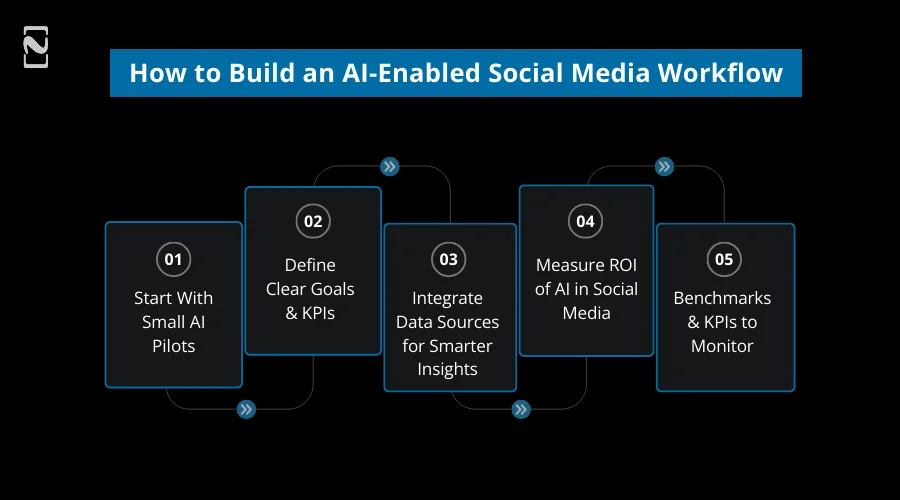
► Start With Small AI Pilots
Digital marketers should avoid implementing AI in every social channel for once and all. Successful teams don’t do this; they start with pilot projects.
Recommended pilot areas:
- AI-based scheduling and post-timing optimization
- Caption and content generation for 1 to 2 platforms
- Automated DM replies for lead qualification or FAQs
Why this works: With small pilots, you can reduce risk, boost adoption, and assist teams in fostering confidence in AI-driven workflows before you scale.
► Define Clear Goals & KPIs
You should ensure you map your AI use case with marketing and business objectives.
Examples of goal alignment:
- For reducing response time, pick AI chatbots for DMs.
- To elevate engagement rate, choose AI content optimization.
- For improving campaign ROI, go for AI performance forecasting.
Key KPIs to define early:
- Content production time
- Engagement rate
- Lead volume from social channels
- Cost per engagement (CPE)
Thus, you can ensure AI tools help you attain expected outcomes.
► Integrate Data Sources for Smarter Insights
AI demands smooth access to connected data to perform best, so no isolated dashboards for sure.
Core systems to integrate:
- AI in CRM helps with lead source tracking and attribution
- AI in analytics tools boosts engagement, reach, conversions
- AI in content calendar, publish schedules, and create performance history.
Outcome: Digital marketers get a unified data ecosystem that analyzes real customer behavior to optimize timing, content, and targeting.
Bonus: 90-Day AI Adoption Plan for Social Media Teams
An organized launch keeps marketing teams aligned and outcomes predictable.
| Days 1–30: Foundation & Testing | Days 31–60: Optimization & Expansion | Days 61–90: Scale & Automate |
| Audit existing social media workflows. | Analyze pilot performance data. | Scale AI workflows across every active channel. |
| Recognize repetitive or time-consuming jobs. | Optimize prompts, workflows, and scheduling rules. | Automate reporting and performance insights. |
| Choose 1 or 2 AI tools for pilots. | Increase AI usage on additional platforms or formats. | Increase AI usage on additional platforms or formats. |
| Train team on AI best practices and limitations. | Introduce AI-based analytics and social listening. | Introduce AI-based analytics and social listening. |
| Milestone: First AI-generated content rollout with baseline metrics captured. | Checkpoint: Engagement trends and time savings documented. | Milestone: AI becomes an essential part of the social media operating model. |
► Measure ROI of AI in Social Media
Leadership buy-in relies on transparent ROI measurement. AI success should be measured across efficiency, cost metrics, and performance.
Key ROI Metrics to Track
Engagement Lift
- % increase in likes, comments, shares
- Growth in follower engagement rate
Time Savings
- Drop in content creation hours
- Quicker response times for DMs and comments
Cost Reductions
- Lower agency or outsourcing costs
- Diminished ad spend wastage through AI optimization
► Benchmarks & KPIs to Monitor
- Engagement rate improvement: 10 to 30% within 90 days
- Content production time reduction: 30 to 50%
- Response time improvement: up to 70% faster
- Cost per engagement (CPE): measurable decline
By tracking these benchmarks, you can prove that AI is not only efficient, but it’s profitable.
Risks, Ethics & Best Practices to Follow
When you, being a leading brand, embed AI in social media workflows, you should maintain equilibrium between innovation and your responsibility.
Ethical AI use is now critical to foster brand trust, long-term credibility, and compliance.
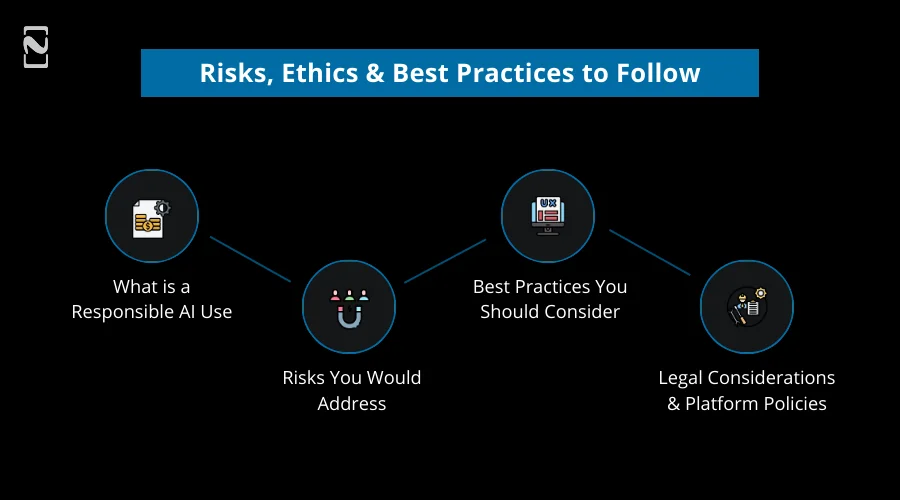
♦ What is a Responsible AI Use?
Well, for that, you should maintain a distance from false positives, deepfakes, and bias.
Undoubtedly, AI systems learn from data. With biased or incomplete datasets, you can lead to unfair targeting, misrepresentation, or incorrect moderation decisions.
♦ Risks You Would Address
- Bias in content recommendations: If your training data is not present in a variety, AI may surface certain viewpoints or demographics.
- False positives in moderation: Chances are high that legitimate posts or comments may be removed or incorrectly flagged.
- Deepfake content risks: AI-generated videos or visuals, if not clearly revealed, may mislead audiences.
♦ Best Practices You Should Consider
- Your brand should consistently audit AI outputs for inaccuracies and bias.
- Also, maintain human review for high-impact content and moderation.
- Avoid using AI in sensitive content edges, like health, politics, and finance.
- With responsible management, AI will boost creativity with no compromise on integrity.
♦ Legal Considerations & Platform Policies
Enterprise AI social media platforms for brands and regulators are increasingly analyzing AI-generated content.
Brands should consider:
- Data privacy laws: You should be compliant with regulations, such as data protection frameworks and GDPR.
- Copyright & IP: Also, AI-generated content may still hold the rights and originality risks.
- Platform-specific rules: Networks, like LinkedIn, TikTok, and Instagram, demand disclosure of manipulated or synthetic data.
Verdict: Remember to align AI workflows with regional legal standards and platform policies, and prefer consulting with legal teams when scaling AI deployment.
How Nimble AppGenie Can Help You Leverage AI in Social Media?
Apart from AI tools, for implementing AI in social media, you need the right strategy, execution, and integration.
Here, Nimble AppGenie kicks in.
By hiring a leading AI development company, Nimble AppGenie, the AI consultants help brands shift from just experimentation to measurable outcomes.
Key Highlights
- End-to-End AI Strategy for Social Media
- Custom AI Integration & Automation
- AI-Driven Insights & Performance Optimization
- Responsible & Ethical AI Implementation
- Scalable Solutions for Growing Businesses
We offer to build scalable AI solutions for startups and enterprises that grow with their social media strategy, leading to lasting success and competitive advantage.
► Why Brands Choose Nimble AppGenie?
- Have proven expertise in AI-powered digital solutions.
- Create custom strategies tailored to business goals.
- Experience in social media app development
- Focus on ROI, sustainability, and compliance.
- Provide end-to-end support, from planning to execution, and ahead.
► AI in Social Media: Real-World Case Study
Client Type: Mid-sized consumer brand
Challenge: Low engagement, manual content workflows, and inconsistent posting.
AI Solution We Implemented:
- AI-powered caption generation
- Smart scheduling & posting optimization
- AI-based sentiment analysis
- Automated DM responses
Results (Within 90 Days):
- 32% increase in engagement rate
- 45% reduction in content creation time
- 60% faster response to customer messages
- Lower cost per engagement across paid campaigns
Key Takeaway: AI didn’t replace the social media team; it just strengthened performance and efficiency.
Conclusion
Are you looking to implement AI in social media workflows, want to know how to start a social media business, or planning for social media integration in mobile apps?
First, you should learn how AI is revolutionizing social media marketing. We have discussed the use cases of AI in social media, AI tools that you can choose, risks you should avoid, best practices you should follow, and more to let your brand scale with AI.
Collaborate with Nimble AppGenie to boost your content, engagement, and ROI with regular personalized social media audits.
FAQs
The cost varies based on tools and scalability :
- Entry-level AI tools: $20–$100/month (approx.)
- Mid-sized business platforms: $100–$500/month (approx.)
- Enterprise AI social media solutions: $1,000+/month (approx.)
Many brands witness increased ROI through higher engagement, time savings, and diminished ad waste.
Yes. If used responsibly, AI is safe for brands.
- AI maintains human oversight.
- It monitors AI-generated content for accuracy and tone
- Also, it follows platform policies and disclosure guidelines
Without supervision, AI can surface risks, like tone mismatch or misinformation. By following best practices, you can reinforce your brand consistency and trust.
Modern teams should have expertise in :
- AI prompt writing & content review skills
- Data interpretation & performance analysis
- Strategic thinking and creative direction
- Ethical AI awareness and compliance knowledge
Platforms with algorithm-driven feeds benefit the most, including:
- TikTok
AI helps brands align their content with how these platforms distribute posts and rank.
Absolutely. Various AI tools are crafted for solopreneurs and small teams, providing:
- Automated post creation
- Smart scheduling
- Basic analytics
Within 30 to 90 days, you can witness outcomes from AI in social media, including:
- Faster content production
- Higher engagement rates
- Improved response times
Besides, the results rely on tool selection, execution quality, and objectives.
Start small :
- Identify repetitive tasks
- Choose 1–2 AI tools
- Run a 30-day pilot
- Measure performance and ROI
- Scale gradually with governance
Partner with an experienced AI solutions provider, like Nimble AppGenie, to reduce risk and accelerate results.

Niketan Sharma, CTO, Nimble AppGenie, is a tech enthusiast with more than a decade of experience in delivering high-value solutions that allow a brand to penetrate the market easily. With a strong hold on mobile app development, he is actively working to help businesses identify the potential of digital transformation by sharing insightful statistics, guides & blogs.
Table of Contents

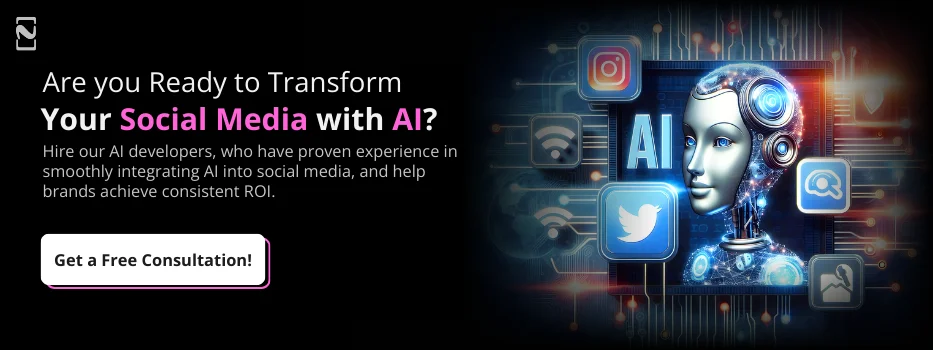
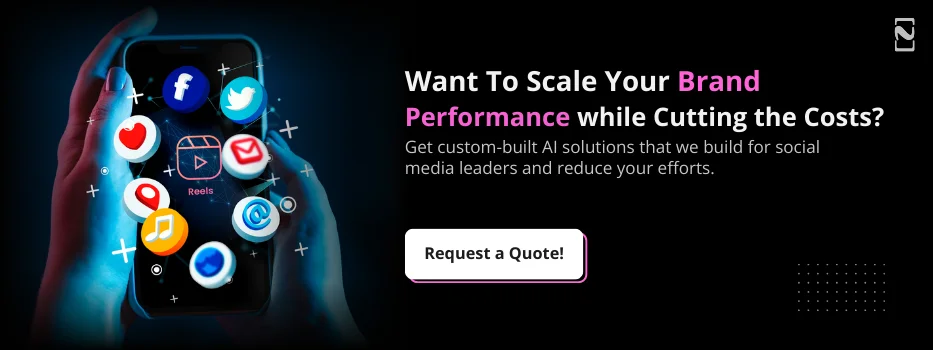
No Comments
Comments are closed.